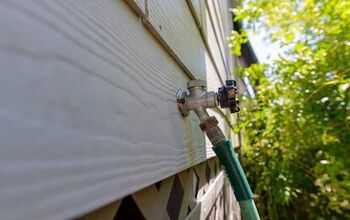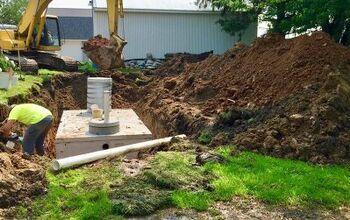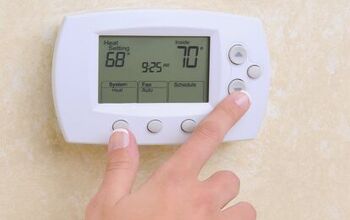Should Your Insulate Your Garage? (Door, Ceiling, Attic, Roof, Walls)

Over time, a garage has turned into more than just a place to store your car. Some people use it as a storage space, a workshop, and sometimes even another bedroom. However, with the frequent visits to your garage, is this a space you should insulate?
Insulating your garage can cut down moisture, contain a fire, prevent insect infestations, and isolate sound. Most importantly, it can provide temperature control and keep the heat inside your garage. This is especially important if you want to make your garage space livable. Finally, insulation will help you save on your energy bill. The only drawback to garage insulation is that it can be too hot in warmer regions like Florida, Texas, and Arizona.
If you’re debating on insulating your garage, but you’re still on the fence, that’s okay! This article will provide you with enough knowledge to help you make the best decision for your home.
Is It Worth Insulating the Garage?
Insulating your garage is worth the time and effort as it is generally beneficial. The insulation will help save on energy costs, protect your belongings or workspace, and keep your car in tip-top shape.
Regardless of the weather in your area, it’s a good idea to insulate the garage. If the weather is hot, the insulation will keep the garage cool. However, if you’re in an area with brutal winters, the insulation will help keep the garage warm.
What Type of Insulation Should I Choose for My Garage?
If you choose to insulate your garage, there are various insulation options to pick from. Each product’s features, usefulness, and pricing will vary:
- Fiberglass Insulation: This is likely the most prevalent form of insulation in garages due to its low cost and high insulative characteristics.
- Spray Foam Insulation: If you want to turn your garage into a central office or gym, this is the ideal type of insulation to use because it has the best R-value (the capacity of a substance to prevent heat flow) and airtight sealing.
- Cellulose Insulation: This is another cutting-edge insulating material that’s gaining traction.
Benefits of Insulating Your Garage
There are numerous benefits to insulating your garage, especially if you plan to spend any given amount of time there. Insulation can help you save money, and keep your family safe.
Below are some more of the benefits:
Helps Fireproof the Building
According to the United States Fire Administration, an estimated 6,600 garage fires occur annually. Garage fires are catastrophic, no matter if they are caused by poor wires or greasy waste. These fires are considerably bigger, travel further, and wreak more havoc than other types of house fires because they take longer to notice.
Insulation will not prevent a fire, but it will help to limit and contain it. The majority of commercial insulation provides some level of fire resistance.
Prevents Insect Infestations
When insulating your garage, you want to ensure that any cracks or openings where air could escape are sealed. But it’s not just the air that moves through those drafty spaces. Bugs can also get through.
As a result, insulate your garage to make it harder for insects to get in. This reduces the number of bugs that can enter your home.
Provides Extra Space
Because of all of the advantages listed above, an insulated garage becomes a lot more comfortable and a more functional place. Your garage doesn’t have to be merely a place where you put your automobile.
You can utilize the extra space in an insulated garage for a workshop or store your exercise equipment. You can use that area just like you would any other in your house.
Sound Insulation
When garages are in use, they can be pretty noisy. Will you use power tools in your garage regularly? Perhaps your garage door opener is particularly loud and is located just beneath your bedroom or office.
Your garage is filled with a variety of loud noises. Therefore, insulation will help dampen the noise so that it doesn’t bother anyone trying to concentrate on something else.
Cuts Back on Moisture
Insulation helps to maintain the heat while also keeping moisture out. Whether you realize it or not, uninsulated garages are susceptible to moisture problems.
Consider the items you have in your garage. Are there any metals, gadgets, seasonal clothes, or Christmas decorations in your collection? Moisture has the potential to damage all of these things.
Temperature Control
Insulation, as previously said, helps to maintain a more consistent temperature within. That’s what it’s for. To enable you to keep your residence extra pleasant inside by leaving external temperatures outside.
You are already losing whatever warmth you add to your garage via the walls due to a lack of insulation. Insulation, on the other hand, will keep the heat in. As a result, your garage will remain warmer for a longer period.
Saves Energy
One of the most important reasons to consider insulating your garage is to reduce your energy expenditures. It’s no different when it comes to your garage.
If you spend that much time in an uninsulated garage, adding insulation can help you save money on your utility bills. This is particularly true if you’re regulating the temperature using a heater or air conditioner.
Disadvantages of Insulating Your Garage
While garage insulation offers numerous advantages, it isn’t without drawbacks. So, let’s look at some of the reasons why you may choose not to insulate your garage:
Higher Price
It can be costly to insulate your garage. The cost of insulation and installation varies. Insulate your garage for an average price of $1.48-$1.95 per square foot.
Of course, your final expenses will be influenced by your location and the insulating material you choose. Professional installation will be more expensive than doing it yourself.
Unsightly Space
One disadvantage of insulation is more cosmetic, but it is still worth addressing. The appearance of exposed insulation can be unappealing. If you insulated your garage but want it to look great because you use this more often, you’ll have to pay extra for drywall.
Your Garage Can Get Too Hot
When we discussed the benefits of insulation, we mentioned its capacity to trap heat, which is fantastic if you live in a cold area. Unfortunately, in warmer regions, it may trap heat as well. That might be a problem.
For example, when you first get into your vehicle, it’s hot since it’s been soaking up the sun. You switch on the air conditioning, cool off the interior, and return home. You may need an air conditioner in your garage, which can spike the electric bill.
Garage Door Issues
The garage door is among the most challenging elements when it comes to garage insulation. Take a look at it; it’s massive. When you open it, you allow your climate-controlled airflow out while letting the outside air in. That is an enormous air release regardless if it’s insulated or not.
Does It Make Sense to Insulate an Unheated Garage?
Insulating an unheated detached garage may improve its livability while also preserving the integrity of your car and other valuables. It is inexpensive if you do it on your own.
If you have pipes or drains that run through your garage, insulating the space can prevent ice from forming on the floor. Insulating an unheated garage is more than preferred; it’s necessary.
Should You Insulate Your Garage Door?
If you’re using your garage to store your car and other belongings, you don’t need to insulate the garage door. Instead, insulate the ceiling and walls that are shared with your home. However, if you or someone else lives in the garage, you’ll want to insulate the garage door for added heat.
Should You Insulate Your Garage Walls?
Insulating your garage walls is important to trap the heat and keep your garage warmer. Without it, you are losing any heat, and it can be quite unbearable in cold weather. The choice to insulate the walls also depends if your garage shares a wall with your house.
A well-insulated garage can prevent carbon monoxide from your car to seep into your home and avoid serious health complications.
Should You Insulate Your Garage Ceiling?
While a garage ceiling doesn’t necessarily require insulation, it’ll increase the average temperature in your garage and reduce your heating bill. Additionally, insulating your ceiling can help prevent warm air from escaping through random gaps or holes.
Should You Insulate Your Garage Attic?
An attic over a garage may not require insulation. If the garage space occupies a shared wall with the living section of the house, that wall should be insulated to minimize cold air from entering the house. However, if you decide not to insulate the attic, you will need to insulate the garage’s roof to keep the temperature in the garage the same.
Should I Insulate My Attached Garage Ceiling?
If you want your garage to be heated or cooled, you’ll have to insulate overhead. All of the money you spend on warming the garage will ascend to the top and escape via the rooftop.
Choosing not to insulate your attached garage ceiling will most likely leave you with a higher energy bill. The insulation will help keep your house at a comfortable temperature. Without the insulation, the temperature-controlled air is escaping through the roof.
How Much Does it Cost to Insulate Your Garage?
| Garage Type | Cost |
| 1 Car Garage | $850 |
| 2 Car Garage | $1,400 |
| 3 Car Garage | $2,000+ |
On average, it will cost $1,400 to insulate a two-car garage fully. The cost of insulating a three-car garage will increase to around $2,000. And a one-car garage costs less, at about $850 from start to finish.
However, many factors go into the pricing of this project, such as the type of insulation you’re using and if you’re doing it alone. The kind of garage insulation you select will impact how much it costs in the long run as well.
Can You Insulate Your Garage on a Budget?
The cheapest form of garage insulation will be determined by several criteria, including the climate where you live and the garage’s architecture. An R-value is assigned to all insulation, indicating the material’s capacity to resist heat conduction.
A higher R-value indicates that the material is more insulating and is better suited to colder temperatures. We advise consulting a specialist to decide which R-value is most appropriate for your location.
Can You Insulate a Garage Without Drywall?
You can technically insulate a garage that does not have drywall; however, we highly advise against this. Drywall helps keep your garage safe as it is a strong, fire-resistant material.
Typically in a garage, you have many different power tools that set off sparks and flammable materials. If you were to insulate a garage with no drywall, this makes your garage easier to catch on fire as insulation burns quickly and easily.
With drywall, you have an extra layer of protection. So, if your garage does catch on fire, you will have time to call the fire department or put it out yourself as it will take longer to burn.
Does Insulation Make Sense In My Area?
Whether or not to insulate a garage is not a simple decision. Many different factors go into this, such as what exactly you’re using your garage for, as well as the type of garage you have. However, the most crucial factor is the climate where you live.
Should I Insulate My Garage in Texas?
In Texas, you should insulate your garage if you’re planning to spend any significant amount of time out there, especially in the summer. Texas is usually hot and dry, which increases the risk of heatstroke. Or, if you’re storing temperature-sensitive products, you might want to think about insulating the garage.
However, it would be okay not to insulate a garage in Texas if you do not meet the above criteria. Since it’s dry and usually warm throughout the year, you don’t need to worry about moisture issues.
Should I Insulate My Garage in Florida?
It is a good idea to insulate your garage if you live in Florida due to the excess moisture in the air. This moisture can make its way into your garage and ruin unprotected cardboard storage boxes as well as pantry food. The humidity has also been known to cause rust on metal surfaces.
Insulating your garage will also make it easier to keep cool if you want to work on your car or dig through your storage boxes. Humidity can make it hard to breathe and raise the heat index, especially in buildings and vehicles. An insulated garage will help avoid this.
Should I Insulate My Garage in Arizona?
You should insulate your garage in Arizona if you’re planning to use the garage as a workshop or mechanic shop. The heat in Arizona can make uninsulated garages unbearable to inhabit for any given length of time. Insulating the garage will provide a safe, comfortable workplace or storage space out of the heat.
However, if you aren’t planning to spend time in your garage and don’t have valuables or food stored there, it would be okay not to insulate. Arizona has dry heat, so you won’t need to worry about moisture.

Heather is a passionate writer who loves anything DIY. Growing up, she learned everything from home repairs to design, and wants to share her tips with you. When she's not writing, she's usually hiking or searching for her next DIY project.
More by Heather Robbins



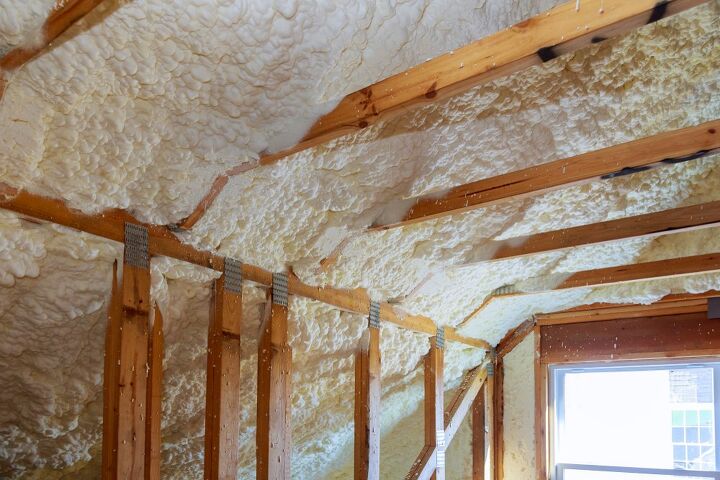












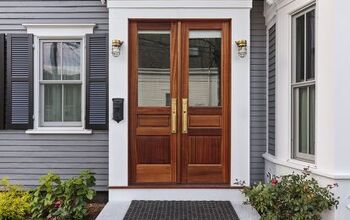

![Cost To Drill A Well [Pricing Per Foot & Cost By State]](https://cdn-fastly.upgradedhome.com/media/2023/07/31/9074980/cost-to-drill-a-well-pricing-per-foot-cost-by-state.jpg?size=350x220)



